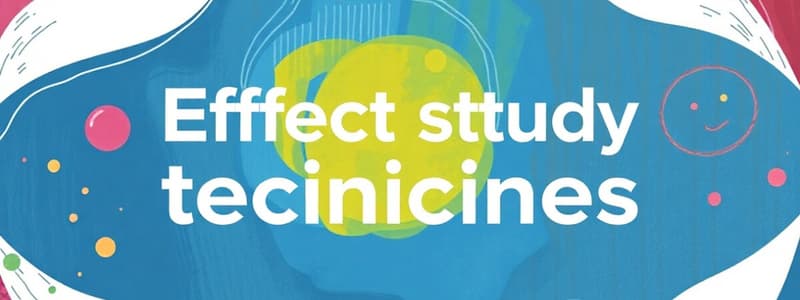Podcast
Questions and Answers
What is the primary focus when studying effectively?
What is the primary focus when studying effectively?
- The quality of study sessions (correct)
- Covering every detail of the material
- Solving all problems regardless of difficulty
- The total number of hours spent studying
What is recommended to do first when reading a chapter for better comprehension?
What is recommended to do first when reading a chapter for better comprehension?
- Skim the summary and key points (correct)
- Read each paragraph in detail
- Take extensive notes from the start
- Read the introduction thoroughly
Which of the following strategies is suggested to enhance study efficiency?
Which of the following strategies is suggested to enhance study efficiency?
- Setting no time constraints to avoid pressure
- Completing difficult problems first
- Batching similar tasks to reduce context switching (correct)
- Rereading entire notes repeatedly for mastery
What should you do if you encounter a difficult problem during study sessions?
What should you do if you encounter a difficult problem during study sessions?
What technique is helpful for organizing your notes during revision?
What technique is helpful for organizing your notes during revision?
Flashcards
Read Backwards
Read Backwards
A strategy that encourages you to focus on the important parts of a chapter by first reading the summary and key points, then working your way back to the beginning.
First Pass
First Pass
A study technique that involves skimming headings, charts, bold terms, and colorful boxes to get a general understanding of the chapter.
Batch similar tasks
Batch similar tasks
A technique for managing your time by grouping together tasks that require similar mental processes, reducing mental fatigue and improving efficiency.
Sunk Cost Fallacy
Sunk Cost Fallacy
Signup and view all the flashcards
Tag notes
Tag notes
Signup and view all the flashcards
Study Notes
Studying Effectively
- Focus on the quality of study sessions, not quantity.
- Read backwards: Start with chapter summaries and key points, then work back to the start.
- First pass: Quickly scan headings, charts, bold terms, and colored boxes for a general understanding.
- Second pass: Read the introduction of sections, skim main sections, and read the conclusion for each section.
- Batch similar tasks: Group tasks needing similar mental processes to prevent frequent task switching.
- Tackle easier tasks first: Begin with the easiest tasks within a batch to facilitate transition to new mental states.
- Set time constraints: Allocate less time for a task to boost efficiency. Tasks tend to expand to fill allocated time.
- Leverage AI tools: Use tools like Grammarly for brainstorming, research, outlining, and enhancing writing.
- Don't dwell on difficult problems: Move on from unsolvable problems and return later. This avoids the sunk cost fallacy.
- Do mindless tasks first: Complete fixed tasks (e.g., flashcards) before variable tasks (e.g., essays) to create time boundaries.
- Tag notes: Mark parts in your notes needing further review for focused review sessions.
- Avoid rereading notes: Focus on sections you find challenging instead of rereading all notes.
Studying That Suits You
Use AI to generate personalized quizzes and flashcards to suit your learning preferences.



